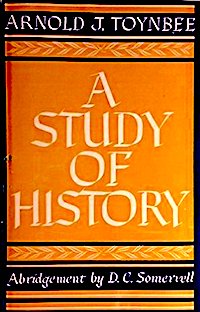

Tao Te Ching

A Study of History
A comprehensive, 12-volume look at world history that was abridged by D.C. Sumervell into two volumes; this work became immensely popular during its days of publication but soon “languished into obscurity”… perhaps because it told truths about our own civilization too difficult to hear. Tracing the rise, growth, flourishing, and fall of 28 different civilizations; the obvious parallels to our modern situation became too painful to ponder for many. His description of Jews as a "fossil society" magnified this discomfort. Popularity aside, the insights here are deep, the lessons important, and the relevance today acute. He basically demonstrates how the Taoist Farmer Story not only applies to individuals but also to world history at large. All these civilization did best and developed most when challenged, motivated by a strong difficulty. "Creative Minorities" discover solutions, inspire, and vitalize the larger society. As the challenge passes though, a general degeneration sets with an idealization of the past instead of a creative response to the current environment. He concludes by defining the major challenge of our time as the need to form an economic and political world order. Pondering the 4 main living civilizations—the Western, Islamic, Hindu, and Far Eastern—Toynbee speculates that either they all merge with Western Civilization, or Western civilization decays and dies.
Themes
Quotes from A Study of History
“Another and earlier form of this reversion to barbarism in the West was Rousseau's gospel of the 'return to nature' and the exaltation of 'the noble savage'... The fundamental gospel of archaism was condensed into a sentence, the opening of Rousseau's Social Contract: 'Man is born free and everywhere he is in chains.' Rousseau's most famous disciple was Robespierre, principal author of the french 'Reign of Terror.' ... This idealizing of the primitive pagan 'Nordic' race cannot entirely disclaim responsibility for the Nazi terror”
Chapters:
Comments: Click to comment
“Dante did not accomplish his life-work until he had been driven to withdraw from his native city... in losing his birthright in Florence, Dante was to win the citizenship of the world; for in exile the genius which had been crossed in politics after being crossed in love found its life-work in creating the Divina Commedia.”
Chapters:
Comments: Click to comment
“It is difficult rather than easy conditions that produce achievements… where life was easy, natives remained primitive… the harder a time a country has had, the more brilliant its record as an originator of civilization.”
Chapters:
Comments: Click to comment
“Machiavelli was able to return to the world on a more etherial plane, on which his effect on the world has been vastly greater... he succeeded in transmuting his practical energies into a series of mighty intellectual works which have been the seeds of our modern, Western political philosophy.”
Chapters:
Comments: Click to comment
“Man achieves civilization, not as a result of superior biological endowment or geographical environment, but as a response to a challenge in a situation of special difficulty which rouses him to make a hitherto unprecedented effort.”
Chapters:
Comments: Click to comment
“Man achieves civilization, not as a result of superior biological endowment or geographical environment, but as a response to a challenge in a situation of special difficulty which rouses him to make a hitherto unprecedented effort.”
Chapters:
Comments: Click to comment
“This active psychological catastrophe in three acts was the commonest theme—the story of Ajax in Sophocles’ play… the condition of being spoiled by success, the consequent loss of mental and moral balance, and the blind headstrong, ungovernable impulse which sweeps an unbalanced soul into attempting the impossible.”
Chapters:
Comments: Click to comment
“This burst of spiritual activity... the Confucian humanism of the 5th century BCE... was ephemeral. It degenerated from a study of human nature into a system of ritualized etiquette. In the administrative sphere it became a tradition that every administrative act required the sanction of historical precedent.”
Chapters:
Comments: Click to comment
“This is a hard saying for adherents of the higher religions of the Judaic family (Judaism, Christianity, and Islam), but it is a truism for Hindus. The spirit of mutual good-will, esteem, and veritable love ... is the traditional spirit of the religions of the Indian family. This is one of India’s gifts to the world.”
Chapters:
Comments: Click to comment
“Tracing the Islamic society bak to its origins, we find that it is itself a fusion of two originally distinct societies: the Iranic and the Arabic… both originating from an extinct society, the Syriac.”
Chapters:
Comments: Click to comment
“Vulgar hedonists took in vain, and brought into disrepute, the name of Epicurus, and for this offence were chided by the austere Epicurean poet, Lucretius.”
Chapters:
Comments: Click to comment
Comments (0)